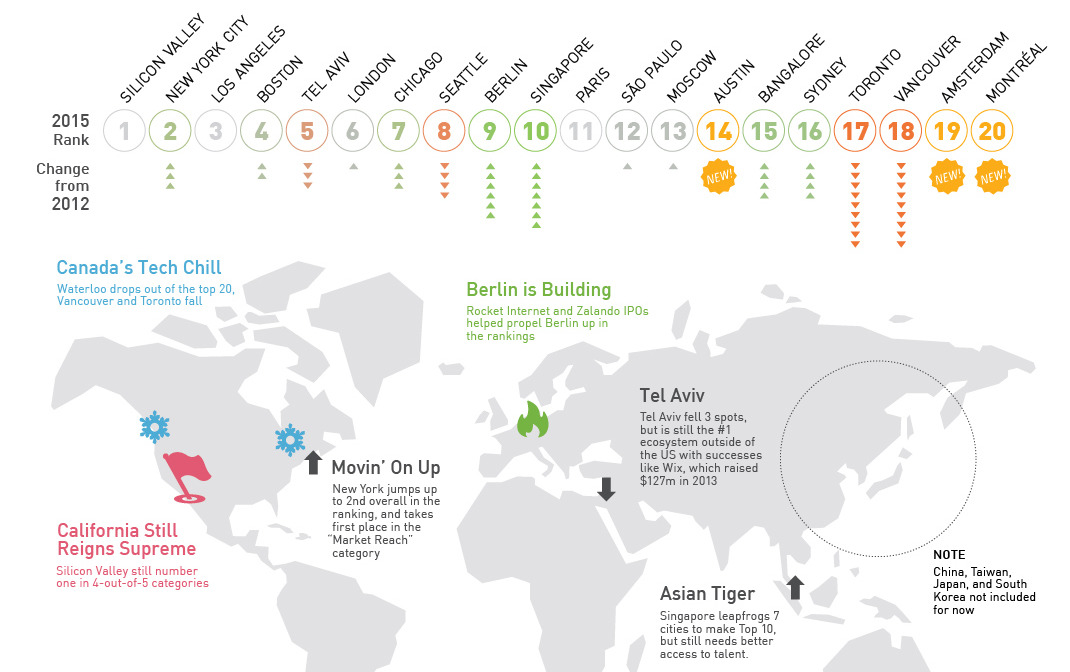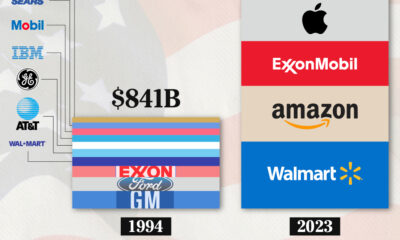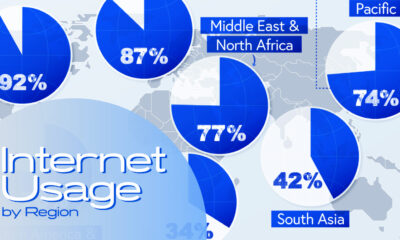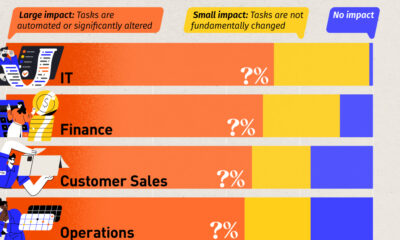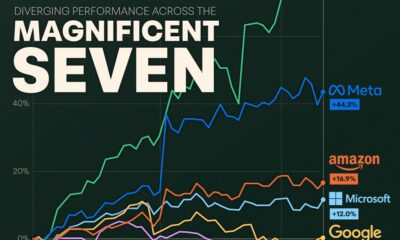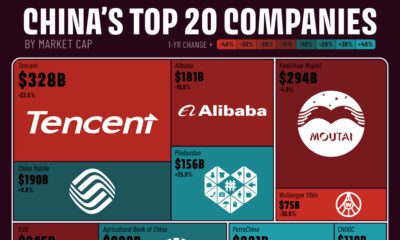Technology
Tech Startup Ecosystem Rankings for 2015 [Chart]
![Tech Startup Ecosystem Rankings for 2015 [Chart]](https://www.visualcapitalist.com/wp-content/uploads/2015/07/startup-ecosystem-rankings-2015-chart.jpg)
Tech Startup Ecosystem Rankings for 2015 [Chart]
Canadian cities get decimated; NYC, Austin, Singapore, and Berlin shoot up startup ecosystem rankings
The Chart of the Week is a weekly Visual Capitalist feature on Fridays.
The Global Startup Ecosystem Ranking 2015 report ranks the top 20 technology startup ecosystems in the world based on Performance, Funding, Market Reach, Talent, and Startup Experience.
Performance is based on the funding and exit valuations of startups headquartered in the ecosystem, and Funding represents the amount of investments by venture capitalists and the time it takes to raise capital. Talent is based on the quality of technical talent, availability, and cost. Market Reach is the local system’s GDP and ease of reaching customers internationally, while Startup Experience is a qualitative measure based on surveying veteran startup mentors and local founders on the success of startups in that particular region.
The report had several significant findings since its last iteration in late 2012. Particular stories that stand out: Canadian cities are dropping drastically, cities outside of North America such as Berlin and Singapore are climbing the rankings, and the United States remains strong with four of the top five ecosystems.
Despite having many companies in the Narwhal Club, home to companies valued at more than $1 billion such as Slack, Hootsuite, and Avigilon, the Canadian market has struggled relative to the rest of the world. Waterloo, home of the once-mighty RIM, has fallen out of the Top 20 altogether. Toronto and Vancouver each dropped nine spots, more than any other ecosystem on the list, claiming the #17 and #18 spots respectively. Vancouver had the third slowest growth out of all cities in the index, and continues to struggle as far as funding goes. Toronto had the fifth slowest growth and also needs to expand growth to venture capital.
In good news for Canada, Montreal debuted on the list, but only at #20.
Slower growth in Canada has been met with exploding markets in Berlin and Singapore. Both of these international centers have had recent success stories that have moved them up the startup ecosystem rankings.
Berlin jumped an impressive six spots to #9 overall and had 20x the average growth of all startup markets. Zalando, Europe’s largest online-only fashion retailer raised $668 million in an IPO to value the company at $6.8 billion overall. Meanwhile, Rocket Internet had the biggest IPO since 2007 in Germany, raising $2 billion.
Singapore moved up seven places, more than any other ecosystem, to round out the Top 10. Growth was relatively average, but the government’s support of the ecosystem and Singapore’s strong financial community helped out its ranking in the Funding category. Garena, a social gaming platform, is valued at $2.5 billion and is one of Singapore’s bright stars.
Lastly, the United States remained on top of the leaderboard with four cities in the Top 5. Silicon Valley remains at the top of the list with the best rankings in all categories (except Market Reach). New York jumped up three spots to finish #2, having the best Market Reach of all cities in the index. Los Angeles and Boston are right behind with the #3 and #4 spots. Austin is also notable, as it debuted on the rankings this year at 14th place.
Technology
Ranked: Semiconductor Companies by Industry Revenue Share
Nvidia is coming for Intel’s crown. Samsung is losing ground. AI is transforming the space. We break down revenue for semiconductor companies.
Semiconductor Companies by Industry Revenue Share
This was originally posted on our Voronoi app. Download the app for free on Apple or Android and discover incredible data-driven charts from a variety of trusted sources.
Did you know that some computer chips are now retailing for the price of a new BMW?
As computers invade nearly every sphere of life, so too have the chips that power them, raising the revenues of the businesses dedicated to designing them.
But how did various chipmakers measure against each other last year?
We rank the biggest semiconductor companies by their percentage share of the industry’s revenues in 2023, using data from Omdia research.
Which Chip Company Made the Most Money in 2023?
Market leader and industry-defining veteran Intel still holds the crown for the most revenue in the sector, crossing $50 billion in 2023, or 10% of the broader industry’s topline.
All is not well at Intel, however, with the company’s stock price down over 20% year-to-date after it revealed billion-dollar losses in its foundry business.
| Rank | Company | 2023 Revenue | % of Industry Revenue |
|---|---|---|---|
| 1 | Intel | $51B | 9.4% |
| 2 | NVIDIA | $49B | 9.0% |
| 3 | Samsung Electronics | $44B | 8.1% |
| 4 | Qualcomm | $31B | 5.7% |
| 5 | Broadcom | $28B | 5.2% |
| 6 | SK Hynix | $24B | 4.4% |
| 7 | AMD | $22B | 4.1% |
| 8 | Apple | $19B | 3.4% |
| 9 | Infineon Tech | $17B | 3.2% |
| 10 | STMicroelectronics | $17B | 3.2% |
| 11 | Texas Instruments | $17B | 3.1% |
| 12 | Micron Technology | $16B | 2.9% |
| 13 | MediaTek | $14B | 2.6% |
| 14 | NXP | $13B | 2.4% |
| 15 | Analog Devices | $12B | 2.2% |
| 16 | Renesas Electronics Corporation | $11B | 1.9% |
| 17 | Sony Semiconductor Solutions Corporation | $10B | 1.9% |
| 18 | Microchip Technology | $8B | 1.5% |
| 19 | Onsemi | $8B | 1.4% |
| 20 | KIOXIA Corporation | $7B | 1.3% |
| N/A | Others | $126B | 23.2% |
| N/A | Total | $545B | 100% |
Note: Figures are rounded. Totals and percentages may not sum to 100.
Meanwhile, Nvidia is very close to overtaking Intel, after declaring $49 billion of topline revenue for 2023. This is more than double its 2022 revenue ($21 billion), increasing its share of industry revenues to 9%.
Nvidia’s meteoric rise has gotten a huge thumbs-up from investors. It became a trillion dollar stock last year, and broke the single-day gain record for market capitalization this year.
Other chipmakers haven’t been as successful. Out of the top 20 semiconductor companies by revenue, 12 did not match their 2022 revenues, including big names like Intel, Samsung, and AMD.
The Many Different Types of Chipmakers
All of these companies may belong to the same industry, but they don’t focus on the same niche.
According to Investopedia, there are four major types of chips, depending on their functionality: microprocessors, memory chips, standard chips, and complex systems on a chip.
Nvidia’s core business was once GPUs for computers (graphics processing units), but in recent years this has drastically shifted towards microprocessors for analytics and AI.
These specialized chips seem to be where the majority of growth is occurring within the sector. For example, companies that are largely in the memory segment—Samsung, SK Hynix, and Micron Technology—saw peak revenues in the mid-2010s.
-

 Green2 weeks ago
Green2 weeks agoRanked: Top Countries by Total Forest Loss Since 2001
-

 Travel1 week ago
Travel1 week agoRanked: The World’s Top Flight Routes, by Revenue
-

 Technology2 weeks ago
Technology2 weeks agoRanked: Semiconductor Companies by Industry Revenue Share
-

 Money2 weeks ago
Money2 weeks agoWhich States Have the Highest Minimum Wage in America?
-

 Real Estate2 weeks ago
Real Estate2 weeks agoRanked: The Most Valuable Housing Markets in America
-
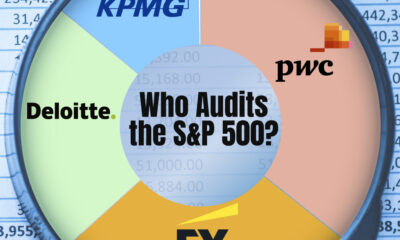
 Markets2 weeks ago
Markets2 weeks agoCharted: Big Four Market Share by S&P 500 Audits
-
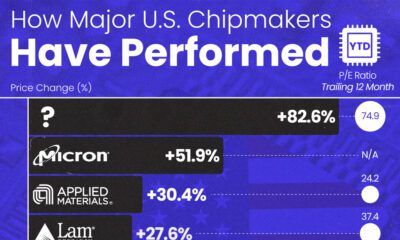
 AI2 weeks ago
AI2 weeks agoThe Stock Performance of U.S. Chipmakers So Far in 2024
-

 Automotive2 weeks ago
Automotive2 weeks agoAlmost Every EV Stock is Down After Q1 2024

